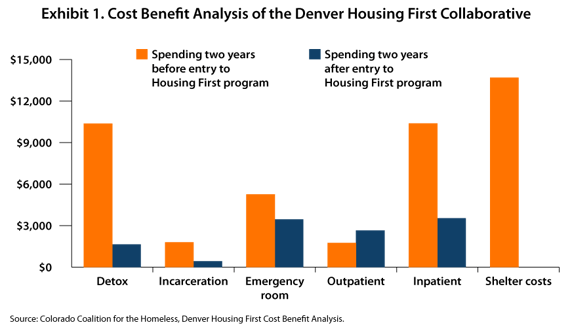In 2018, the Colorado Coalition for the Homeless (CCH) granted a $2.4 million dollar expansion to the “Housing First” model that they have already been using for two decades. The CCH continues to see success in their Housing First programs, which are harm reduction models focused on securing housing for homeless individuals before addressing other social determinants of health.
Cathy Alderman, Vice President of Communications and Public Policy at CCH, explains that confronting personal issues for the chronically homeless is often “too much to take on. If you’re living on the street, it is too difficult to address all of those issues before you are in a stable place.”
How Housing First Works in Denver
The Denver Housing First Collaborative (DHFC), a collaboration between the CCH and various other local service providers, has set up a system to help the homeless find permanent housing and acquire necessary support and benefits.
Affordable housing is provided to participants through government-funded supportive housing complexes as well as scattered site apartments managed by private landlords. By allocating 30 percent of their income to pay rent, tenants are able to prioritize their own housing stability which is brought to them by their new living situation.
The DHFC carefully allots each participant a unit based on what their present health and treatment obligations may be. If their needs - such as hospitalization or criminal charges - are not an immediate priority, then the tenant can access housing immediately.
The DHFC has adopted an Assertive Community Treatment (ACT) model to provide care to the population they serve. ACT programs such as psychiatric evaluation, medication management, and employment evaluations can be deployed in the tenant’s environment as opposed to requiring them to go to an office.
Although some find it hard to adjust, the initial step of becoming housed allows a support structure to wrap around the individual, helping them gain more trust in the system and open up to more ongoing, preventive care.
Housing First’s Impact in Denver
The goal of the Housing First initiative is to end chronic homelessness, especially in the population of high resource utilizers that can cost more than $29,000 per person each year. The graph below illustrates the effectiveness of the program in reducing overall care expenses in the Denver area.

Factoring in the investment costs of the Housing First Program as well as the total savings for this four year period, the total net cost savings for the DHFC was $711,734, or $4,745 per person. The only service that consumed more money than before was outpatient health, because participants were directed to more care that could help them over the long term.
After the first year of funding from their Social Impact Bond in 2018, Denver surpassed their goals with 83% of Housing First participants not spending a night in jail and maintaining an 87% retention rate of persons within the program.
In Denver, the Housing First model became very effective at helping the needs of the chronically homeless as well as reduced taxpayer funded services across the board. As quality of life in the Denver community continues to improve, the Housing First trend is catching the attention of cities worldwide.

Sources:
Denver Invests $2.4 Million into Housing First
Colorado Coalition for the Homeless Cost Benefit Analysis
Denver Housing First Collaborative